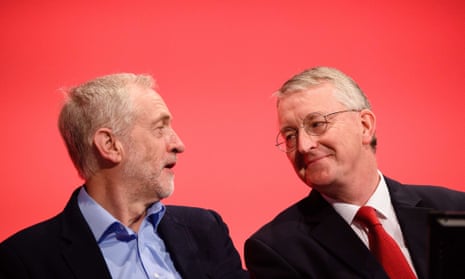Labour MPs are to get a free vote on whether airstrikes should be extended to Syria, with Jeremy Corbyn and Hilary Benn expected to adopt opposing positions in any Commons debate on the issue.
At a heated meeting of the shadow cabinet on Monday afternoon Corbyn agreed to a free vote – a decision that emerged just before the meeting started. It followed a weekend of discussion with Labour’s deputy leader, Tom Watson.
However, a proposal that the shadow cabinet should agree that it was party policy to oppose airstrikes, and to assert this was in line with a conference motion passed in September, was thrown out.
Shadow cabinet members said the offer of a free vote for Labour MPs would be severely diluted if there was also a statement saying party policy opposed airstrikes.
At one point in the meeting Benn, the shadow foreign secretary, said he would not be able to speak from the frontbench if the party had a formal policy to oppose airstrikes. Instead, he would have insisted on the right to speak from the backbenches.
Following the meeting, it was agreed that Corbyn would open the debate opposing airstrikes. Meanwhile, Benn, at the close of the debate, would support it.
Cameron is expected make a statement outlining how he intends to proceed on Monday evening.
The Ministry of Defence has been told by some Labour MPs that about 60 MPs are willing to support airstrikes but that number might rise if the defence secretary allows time for a two-day debate and makes a serious effort to address Labour MPs’ concerns.
A senior Labour source said Labour MPs’ concerns were on points of genuine detail and were not an excuse to oppose airstrikes. The source suggested it might be necessary for MPs to be given as long as a fortnight for their issues to be addressed.
At the meeting, Corbyn’s team tried to defer the decision on how it would handle the issue of current party policy, but members of the shadow cabinet said they would not leave the room until a collective decision had been agreed.
The outcome overall probably represents a defeat for Corbyn, who believed the tide was with him to oppose airstrikes, citing a poll of party opinion at the weekend showing 75% of party members on a sample of those consulted had opposed them.
His close colleagues Diane Abbott had called for the imposition of a whip against airstrikes, but discovered she was isolated at the meeting.
Corbyn soon found himself under attack from shadow cabinet members angry at the way the leader’s office had handled the issue including setting out the opinion of the leader on Thursday before the shadow cabinet had completed discussions.
At one point Andy Burnham, the shadow home secretary, accused Corbyn and his office of trying to stoke hostility to Labour MPs who supported airstrikes.
Another shadow cabinet member opposed to airstrikes, Ian Murray, the shadow Scottish secretary, complained that groups were orchestrating campaigns against MPs, saying he had received nearly a thousand emails telling him to oppose the war.
Others present accused the leader and his team of exposing colleagues, stoking dissent and undermining people. “The mood was very angry. Phrases like ‘lack of respect’, ‘deplorable’ and ‘embarrassment’ were being thrown around,” said one.
In an official party statement. Labour said: “Today’s shadow cabinet agreed to back Jeremy Corbyn’s recommendation of a free vote on the government’s proposal to authorise UK bombing in Syria.
“The shadow cabinet decided to support the call for David Cameron to step back from the rush to war and hold a full two-day debate in the House of Commons on such a crucial national decision.
“Shadow cabinet members agreed to call David Cameron to account on the unanswered questions raised by his case for bombing: including how it would accelerate a negotiated settlement of the Syrian civil war; what ground troops would take territory evacuated by Isis; military coordination and strategy; the refugee crisis and the imperative to cut off of supplies to Isis.”
